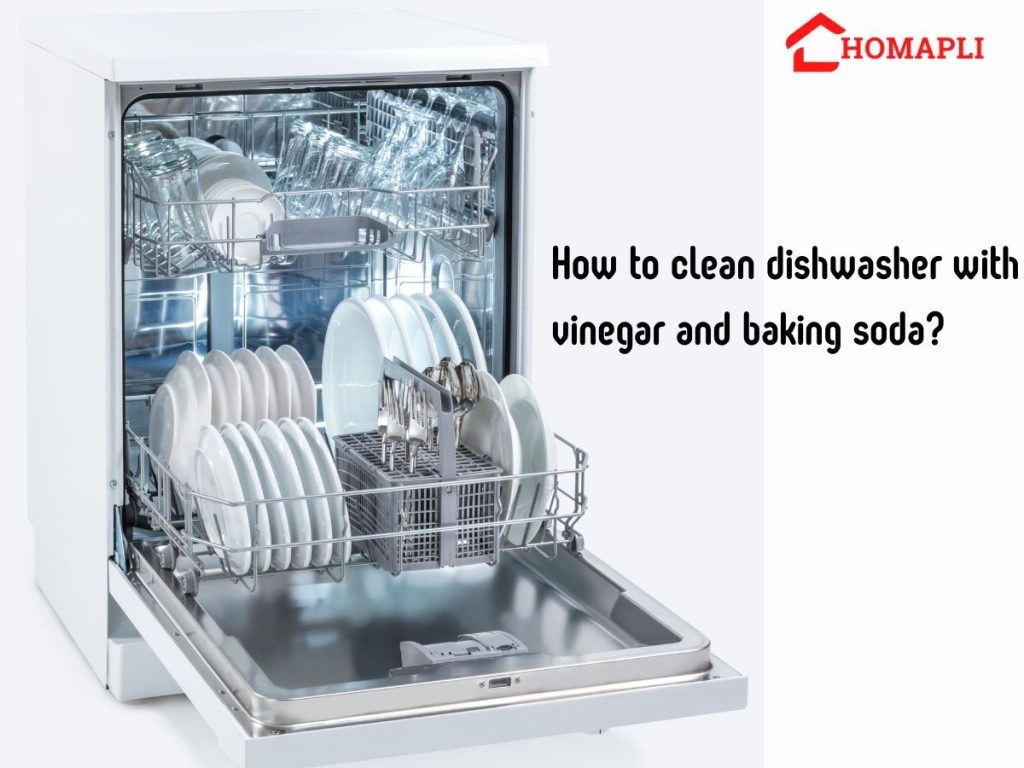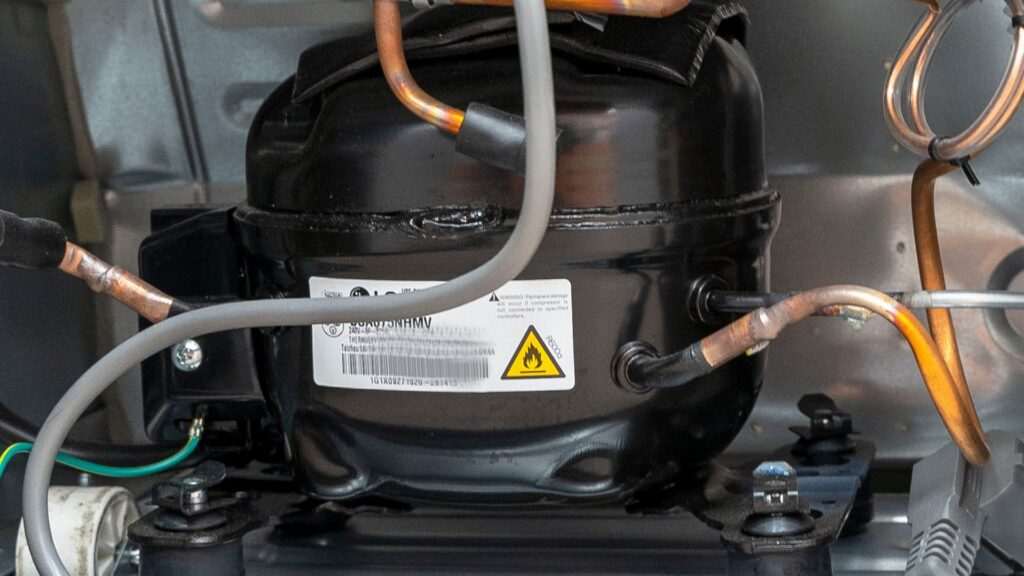Maintaining the functionality of your kitchen appliances is as crucial as performing regular cleaning of your home living spaces. The dishwasher, your trusty companion in daily kitchen duties, also needs a bit of tender love and care. However, with various commercial cleaning products available, it’s easy to overlook the simplicity and effectiveness of natural solutions. Is your dishwasher not smelling as fresh as your favorite sweater after laundry day? Or maybe it’s not cleaning as well as it used to. It might be high time for a routine maintenance session. You’d be surprised at how vinegar and baking soda, the dynamic cleaning duo of the household, can rejuvenate your dishwasher to sparkling conditions in a single wash cycle. In this blog post, We Will explain how to Clean dishwasher with vinegar and baking soda?
- Understanding the Build-Up Within Your Dishwasher
- The Grime That Lurks Within – Why Dishwasher Cleaning Is Essential
- The Vinegar and Baking Soda Miracle – How It Works
- Step-By-Step Guide to Cleaning Your Dishwasher with Vinegar and Baking Soda
- When to Seek Professional Help
- Expert Tips and Advanced Cleaning Techniques
- The Benefits of DIY Dishwasher Cleaning
- In Summary – A Refreshed Dishwasher, A Happy Home
- Conclusion
- Frequently Asked Questions
Understanding the Build-Up Within Your Dishwasher
Before you roll up your sleeves and get cleaning, it’s important to understand the culprits that are likely causing you dishwashing distress. Over time, food particles, grease, and soap scum can build up on the walls, racks, and door gaskets of your dishwasher. This residue can not only produce a foul odor but can also hinder the performance of the machine.
Sometimes, the source of the problem isn’t even within the dishwasher; rather, it could be the residues from your hard water that have accumulated over time. These mineral deposits can clog the spray arms, leading to ineffective wash cycles.
Knowing the components of your dishwasher and the potential trouble spots will guide you to a more thorough cleaning. Now, with the vinegar and baking soda within arm’s reach, it’s time to banish the grime.
The Grime That Lurks Within – Why Dishwasher Cleaning Is Essential
A dishwasher, though it may seem like a self-cleaning machine due to its frequent exposure to soap and water, is not immune to accumulating grime. Over time, food particles, grease, and soap scum build-up, leading to two common problems: a lingering odor and less effective cleaning. The tiny spaces in the dishwasher, such as the filter, spray arms, and door gaskets, can be havens for bacteria and mildew if not cleaned regularly. But worry not; we have a cost-effective and home-friendly solution – vinegar and baking soda.
The Vinegar and Baking Soda Miracle – How It Works
The natural acidic properties of vinegar dissolve mineral deposits and break down limescale, while baking soda – a gentle abrasive yet excellent deodorizer – gives your cleaning power that extra oomph. This DIY cleaning process is non-toxic, eco-friendly, and safe for all dishwasher components, including stainless steel interiors.
Step-By-Step Guide to Cleaning Your Dishwasher with Vinegar and Baking Soda
Cleaning your dishwasher with vinegar and baking soda is a multi-step process. Each step serves a crucial role in breaking down and removing the different types of residue that plague your machine, leading to a more effective clean. Here we learn how to Clean dishwasher with vinegar and baking soda.
Materials You Will Need
- White distilled vinegar
- Baking soda
- A soft-bristled brush (an old toothbrush works wonders on hard-to-reach areas)
- A clean microfiber cloth
Step-1: Clean the Rim
- Unplug the dishwasher for safety. Even though you won’t be coming into direct contact with any electrical components, unplugging it is the safest approach.
- Check for gunk. Open the dishwasher and look around the rim where the door meets the body of the machine. You might find a line of gunk there that needs to be removed.
- Make a vinegar-soaked cloth. Apply vinegar to a soft cloth and run it along the rim. The acidity of the vinegar will help break down any grease and grime.
- Scrub gently. Use a cloth or a soft-bristled toothbrush to gently scrub away any residue. Take care not to use anything abrasive that could scratch the surface.
- Rinse. Once you’ve scrubbed the entire rim, rinse the area with a wet cloth to remove any remaining vinegar and residue.
Step-2: Clean the Drain
- Clear out the drain.
- Remove the top shelf of your dishwasher to access the drain.
- Check for any large particles like food scraps or pieces of paper that may be clogging the drain.
- Remove these by hand or with a gentle stream of water.
- Prepare the vinegar solution.
- Mix equal amounts of vinegar and warm water in a mixing dish.
- For extra cleaning power, add a few drops of dish soap.
- Pour the solution.
- Slowly pour the vinegar and water mixture down the drain.
- It will fizz as it reacts with any leftover soap or food particles.
- Rinse with hot water.
- Heat a pot of water until just before boiling.
- Carefully pour the hot water down the drain to flush out the loosened particles.
- Return drain cover and shelf.
- Once you’re satisfied that the drain is clear, replace the drain cover and the top shelf.
Step-3: Run a Vinegar Cycle
- Fill a dishwasher-safe bowl with vinegar.
- Place the bowl on your dishwasher’s top rack.
- A cup of vinegar should be sufficient, but you can use more for heavily soiled machines.
- Run a hot water cycle.
- Use the hottest water setting your dishwasher offers.
- If your dishwasher has a sanitizing cycle, now is the time to use it.
- Pause the cycle.
- Once the dishwasher starts the wash cycle, pause the machine before it goes into the drain cycle.
- This will allow the vinegar to sit in the machine and do its work for about an hour.
- Complete the cycle.
- After the pause, allow the dishwasher to complete the cycle as usual.
- The hot water and the vinegar should thoroughly clean out the interior of the machine.
Step 4: Baking Soda Scrub
- Sprinkle baking soda.
- Add a layer of baking soda to the bottom of your dishwasher.
- This will further deodorize and help to scrub away the leftover vinegar and any lingering odor.
- Run another hot water cycle.
- Run a hot water cycle without any dishes and with the baking soda in place.
- This final step will leave your dishwasher smelling fresh and looking clean.
At this point, your dishwasher should be as good as new, ready to take on whatever dirty dishes come its way. Not only does this method clean your dishwasher effectively, but it’s also much gentler on the environment than the harsh chemicals found in many store-bought cleaners.
It’s important to perform these cleaning tasks regularly to maintain the health of your dishwasher. Depending on how often you run your dishwasher and the hardness of your water, aim to give your appliance a vinegar and baking soda deep clean once a month or as often as necessary.
When to Seek Professional Help
If you’ve tried the vinegar and baking soda method and still encounter problems with your dishwasher’s functionality, it may be time to call a professional. Signs that your machine needs expert attention include:
- Persistent odors: If the odor returns quickly after cleaning, there could be a more serious problem.
- Visible damage: Scratches, dents, or cracks in the walls or components of the dishwasher could affect its performance.
- Strange noises or water leakage: These are signs of mechanical issues that a professional should address.
- Failure to clean dishes properly: If the dishwasher isn’t cleaning as effectively as it used to, there could be a problem with the spray arms or water circulation.
Remember that a well-maintained dishwasher not only leaves your dishes sparkling but also saves water and energy, making it a smart investment in the long run.
Expert Tips and Advanced Cleaning Techniques
Regular Maintenance is the Best Maintenance
The best way to keep your dishwasher in good shape is to perform regular maintenance. After each wash cycle, check for any remaining food particles or debris. Wipe down the door gasket with a damp cloth after every use and leave the door ajar to allow moisture to escape and prevent the growth of mold or mildew.
When to Call in the Pros
If you’ve tried the vinegar and baking soda cleaning method and your dishwasher still isn’t working as it should, it might be time to call a professional. This could indicate a larger problem with the machine that requires the attention of a technician.
Dealing With Hard Water
If you live in an area with hard water, you may notice more mineral buildup in your dishwasher. In this case, you can add a water-softening filter to your home’s plumbing system or consider using a dishwasher cleaner specifically designed for hard water deposits in conjunction with the vinegar and baking soda method.
The Benefits of DIY Dishwasher Cleaning
Cost-Efficient
When a simple pantry staple combined with a splash of vinegar can do the trick, it’s far more economical than purchasing special dishwasher cleaning products.
Environmentally Friendly
The natural properties of vinegar and baking soda are not only kind to your dishwasher but also to the environment. They involve no harmful chemicals and minimize your household’s impact on the planet.
Safe for All Ages
With young children or pets in the home, it’s reassuring to know that the cleaning solution is safe and natural.
In Summary – A Refreshed Dishwasher, A Happy Home
A clean dishwasher is more than just a repository for shiny dishes. It signifies the care and attention to detail you put into your home, and it ensures a hygienic environment for your family. By taking a few extra steps in maintaining one of the most vital appliances in your kitchen, you’re not only prolonging its life but also enhancing its performance. The next time you open your dishwasher, the fresh scent should be just as delightful as the smile-worthy gleam from your sparkling tableware. Happy dishwashing!
Conclusion
The beauty of using vinegar and baking soda to clean your dishwasher lies in its simplicity and effectiveness. These pantry staples offer a safe and natural way to remove the toughest residues and odors, leaving your dishes—and your dishwasher—cleaner than you could have imagined.
Incorporating this DIY cleaning routine into your regular household maintenance will not only keep your dishes looking their best but will also extend the lifespan of your dishwasher. Start with this deep-cleaning method to revitalize your appliance and enjoy the rewards of a fresher, more hygienic kitchen.
Frequently Asked Questions
Yes, vinegar and baking soda are safe for all dishwashers. They are gentle on the interior components of your machine but powerful enough to break down tough grime and mineral deposits.
While using just vinegar in a cycle can help deodorize and clean, the baking soda’s abrasive properties offer an extra level of scrubbing power that is especially effective for stubborn residues.
No, the vinegar and baking soda solution is safe for plastic components in your dishwasher. However, as with any cleaning method, it’s best to follow the instructions and avoid using any abrasive tools on plastic surfaces
This deep-cleaning method is powerful, but it’s not necessary to perform it every time you clean your dishes. Once a month is a good frequency for regular maintenance. If you notice persistent odors or a drop in cleaning performance, try this method more frequently.



